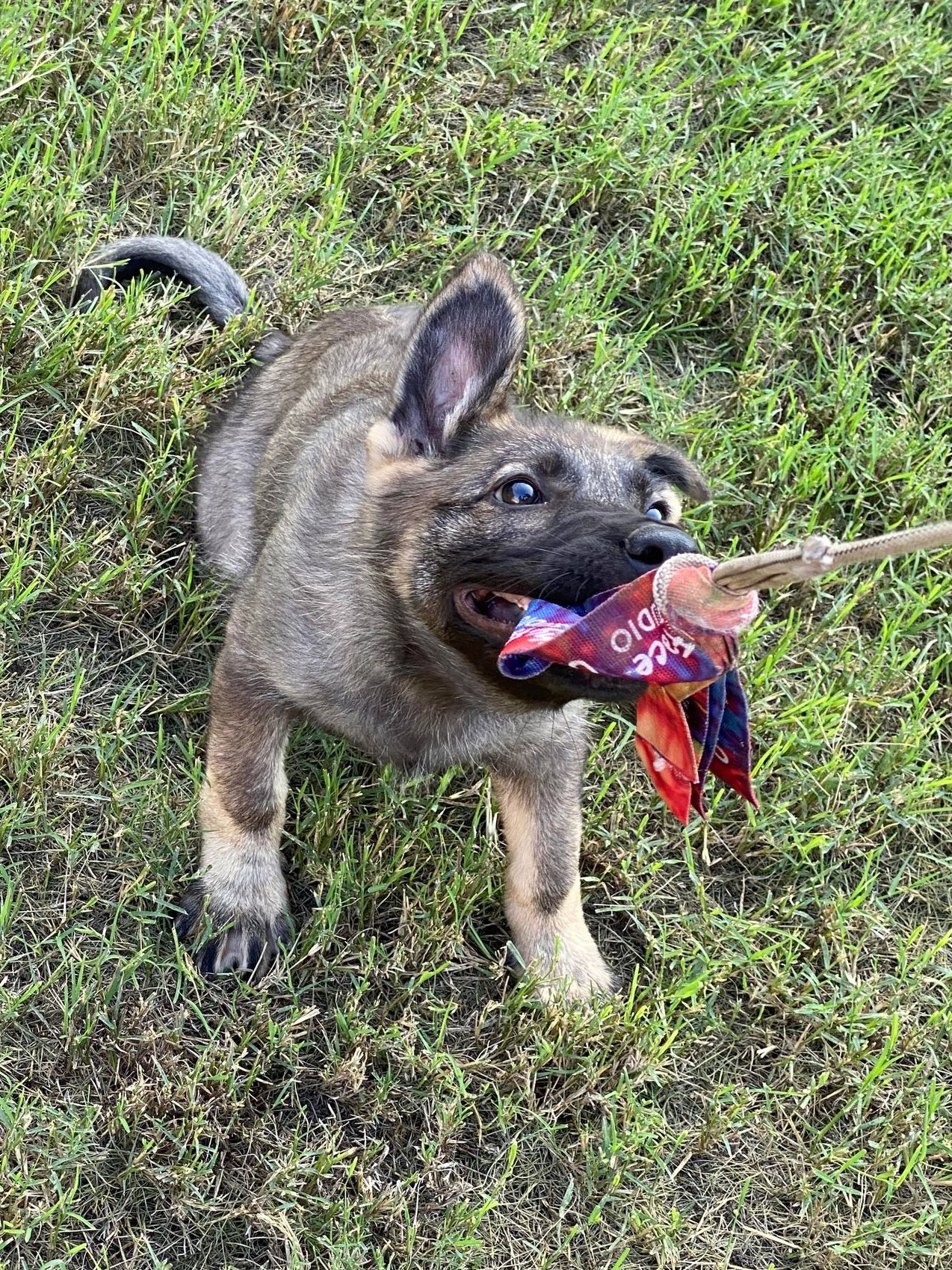Working Line German Shepherd Puppies: Sometimes Referred to as German Sheepdog Puppies
Time to Read: Approximately 7 minutes
When searching for a German Shepherd puppy, you see some people using the term “German Sheepdog puppies.” This term can throw people off, creating confusion. Understanding that most people speaking of German Sheepdog puppies are referring to German Shepherds, and more specifically, working line GSDs can be helpful. Like the term Alsatian Shepherd, this nomenclature of people speaking of German Sheepdog puppies, while less common in the United States, will be more common in parts of Europe.
Historical Background of the Phrase German Sheepdog Puppies
To understand why working line German Shepherd puppies are synonymous with German Sheepdog puppies, it’s essential to look at the breed’s origins. The German Shepherd Dog (GSD) was developed in Germany in the late 19th and early 20th centuries. Captain Max von Stephanitz is credited with creating the breed by focusing on dogs that excelled in herding and had the physical capabilities and intelligence required for versatile working roles.
The primary purpose of the breed was to herd sheep, which is why their offspring were also known as “German Sheepdog puppies.” Over time, their roles expanded to include police work, search and rescue, military roles, and more.
The Working Line German Shepherd
Working line German Shepherds are bred with a specific focus on their ability to perform labor-intensive tasks. These lines prioritize physical endurance, agility, intelligence, and drive over appearance. The breeding practices for these dogs ensure that they are well-suited for physically and mentally demanding roles.
Characteristics of Working Line German Shepherds:
– Physical Build: Working line German Shepherds typically have a more robust and athletic build compared to their show line counterparts. They have straight backs and a more muscular frame, which contributes to their endurance and agility.
– Temperament: These dogs are known for their high energy levels and strong work ethic. They are highly trainable, intelligent, and eager to please, making them ideal for various working roles.
– Coat and Color: Working line German Shepherds often exhibit a variety of coat colors, most commonly sable, black, or bi-color. Their coats are usually more functional, providing protection from the elements during work.
German Sheepdog: Another Name for German Shepherds
German Sheepdog: Another Name for GSDThe term “German Sheepdog” is essentially another name for the German Shepherd, particularly when referring to the breed’s working capabilities. This term emphasizes their origins and original purpose as herding dogs. Thus, when you hear about German Sheepdog puppies, you are actually hearing about working line German Shepherd puppies.
Given their origins as herding dogs, the traits that make working line German Shepherds suitable for modern roles like police work, search and rescue, and service dogs are directly connected to their sheepdog heritage.
Why the Confusion Between Names?
The confusion between “German Shepherd” and “German Sheepdog” can arise from regional differences and the historical context of the breed’s development. When German Shepherds were first introduced, their primary role was herding, and they were commonly referred to as sheepdogs in various regions. As their roles expanded, the name “German Shepherd” became more widespread to reflect their versatility.
However, the use of “German Sheepdog” persists in certain contexts, particularly in working environments where their herding and working capabilities are emphasized.
The Role of Working Line German Shepherds in Modern Tasks
Working line German Shepherds excel in various modern roles due to their physical and mental attributes. These tasks often include:
– Police and Military Work: Their intelligence, trainability, and physical capabilities make them ideal for roles such as detection, tracking, and apprehending suspects.
– Search and Rescue: Their keen sense of smell and high endurance levels enable them to work in challenging environments, locating missing persons in disaster-stricken areas.
– Service Dogs: Their loyalty, intelligence, and calm demeanor make them suitable for assisting individuals with disabilities, including guiding the visually impaired and providing support for those with PTSD.
– Sport and Competition: Working line German Shepherds often participate in dog sports and competitions such as Schutzhund, agility, and obedience trials, showcasing their physical and mental agility.Selecting a – Working Line German Shepherd Puppy: When choosing a working line German Shepherd puppy, also known as a German Sheepdog puppy, there are several factors to consider to ensure you select a healthy and well-suited companion for your needs.
Breeder Research on Where to Find Highest Quality German Sheepdog Puppies
– Reputation: Look for reputable breeders who prioritize the health and temperament of their dogs. Breeders registered with organizations such as the American Kennel Club (AKC) and the United Schutzhund Clubs of America (USCA) can be a good starting point.
– Health Testing: Ensure the breeder conducts health tests for common genetic issues such as hip and elbow dysplasia, degenerative myelopathy, and other hereditary conditions.
– Environment: Puppies should be raised in a clean, stimulating environment with plenty of socialization. Visiting the breeder’s facility can provide insights into how the puppies are raised.
Puppy Evaluation:
– Temperament: Observe the puppy’s temperament. Look for signs of curiosity, confidence, and friendliness. Puppies should be eager to interact with humans and other animals.
– Health: Ask for vaccination and parasite prevention records from the breeder. Ensure the puppy has received its initial vaccinations and treatments for common parasites. Of particular note will be the virus Parvo. It has often been said that a single infected dog feces carries enough viral particulates to infect over a thousand dogs. Ideally, find a breeder vaccinating with Neopar. Arguably one of the worlds most effective Parvo vaccines, many vets and breeders consider this vaccine head and shoulders above most five and seven way shots. Find a breeder of German Sheepdog puppies who makes use of Neopar in protecting their puppies.
Training and Socialization
Training and socialization are crucial for working line German Shepherd puppies. These dogs thrive on mental and physical stimulation, requiring structured training programs to develop their abilities.
Early Socialization:
– Exposure to Various Stimuli:** Introduce the puppy to different sights, sounds, and environments to build their confidence and adaptability.
– Interaction with People and Animals:** Regular interaction with different people and other animals helps develop well-rounded social skills.
Structured Training:
– Basic Obedience: Start with basic obedience training, teaching commands such as sit, stay, come, and heel. Positive reinforcement techniques are highly effective.
– Advanced Training: Depending on the intended role, consider advanced training programs for specific tasks such as tracking, protection, or competition.
The Lifelong Commitment
Owning a working line German Shepherd, or German Sheepdog, is a lifelong commitment that involves ongoing training, socialization, and care. These dogs require a significant amount of time and attention to remain healthy and happy.
Exercise Needs:
– Daily Physical Activity: Ensure the dog receives ample exercise, including long walks, playtime, and structured activities that engage their mind and body.
– Mental Stimulation: Provide mental challenges through puzzle toys, training exercises, and interactive games to keep the dog mentally sharp.
Health Care:
– Regular Vet Visits: Schedule regular veterinary check-ups to monitor the dog’s health and catch any potential issues early.
– Balanced Diet: Feed a nutritious diet appropriate for the dog’s age, weight, and activity level to maintain optimal health.
Conclusion
Working line German Shepherd puppies, often referred to as German Sheepdog puppies, are one and the same. Understanding that these terms are interchangeable can help clarify your search for the perfect canine companion. Their rich history as herding dogs has endowed them with the intelligence, drive, and versatility needed for various modern tasks. Whether you are looking for a family pet, a working dog, or a companion for specific activities, working line German Shepherd puppies offer a blend of traits that make them exceptional choices. Ensure you choose a reputable breeder, provide adequate training and socialization, and commit to their lifelong care to enjoy a fulfilling relationship as you are searching for new German Shepherd puppies to buy.
Bibliography
American Kennel Club. (n.d.). German Shepherd Dog Information. Retrieved from https://www.akc.org/dog-breeds/german-shepherd-dog/
United Schutzhund Clubs of America. (n.d.). Schutzhund: A Brief Overview. Retrieved from https://www.germanshepherddog.com/schutzhund/
Orthopedic Foundation for Animals. (n.d.). Hip Dysplasia. Retrieved from https://www.ofa.org/diseases/hip-dysplasia
PennHIP. (n.d.). What is PennHIP? Retrieved from https://antechimagingservices.com/pennhip/what-is-pennhip
German Shepherd Dog Club of America. (n.d.). Breed Information. Retrieved from https://gsdca.org/german-shepherd-dogs/about-the-breed
PetMD. (n.d.). The Health and Characteristics of Working Line German Shepherds. Retrieved from https://www.petmd.com/dog/working-line-german-shepherd




